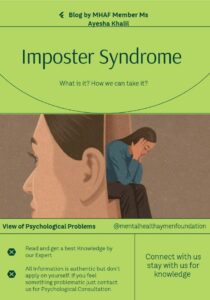
Imposter Syndrome
The Psychology of Imposter Syndrome:
We define imposters as persons who despite clear evidence of high achievement in their professions still feel like phonies , like they are indeed frauds. The victims of imposter syndrome regularly deny the fact that they possess the skill and hard work to achieve those results. I have observed that such a type of perfectionism is typical for people who are simply outstanding in their achievements, and it frequently results in chronic doubts, anxiety, and even fear that someone will realize their incompetence.
Impostor syndrome is classified by psychologists into several categories. They are the perfectionist type who feel compelled to excel most; The soloist type who cannot ask for assistance because he or she feels incompetent. This is because people experiencing imposter syndrome are highly capable and still do not feel like they deserve success. Unfavorable feelings may result from social comparison, as well as environments that promote high performance.
Imposter syndrome relates to acceptance, cognition, behavior, and emotions that disown the individuals’ accomplishments; strategies can include acknowledgment of negative self-talking, appreciation of accomplishments and talking with peers.
